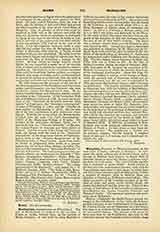

Mammon, Mamona; the spelling Mammona is contrary to the textual evidence and seems not to occur in printed Bibles till the edition of Elzevir. The derivation of the word is uncertain, perhaps from MMN as seen in MMMVN, though the Targums, which use the word frequently, never regard it as the equivalent of MMMYN, which the Greek always renders th?sauroi, cf. Job, iii, 4; Prov., ii, 4. But cf. also Hebrew Ecclus., BT LAB MMMNT SQR, where the margin reads MMMYN; “to the father his daughter is as ill-gotten treasure.’ In N. T. only Matt., vi, 24, and Luke, xvi, 9, 11, 13, the latter verse repeating Matt., vi, 24. In Luke, xvi, 9 and 11 Mammon is personified, hence the prevalent notion, emphasized by Milton, that Mammon was a deity. Nothing definite can be adduced from the Fathers in support of this; most of their expressions which seem to favor it may be easily explained by the personification in Luke; e.g. “Didascalia”, “De solo Mammona cogitant, quorum Deus est sacculus”; similarly St. Augustine, “Lucrum Punice Mammon dicitur” (Serm. on Mt., ii); St. Jerome in one place goes near to such an identification when (Dial. cum Lucif., 5) he quotes the words: “No man can serve two masters”, and then adds, “What concord hath Christ with Belial?” But in his “Commentary on Matt,” and in Ep. xxii, 31, he lends no countenance to it: “‘Ye cannot serve God and Mammon.’ Riches, that is; for in the heathen tongue of the Syrians riches are called Mammon.” But Mammon was commonly regarded as a deity in the Middle Ages; thus Peter Lombard (II, dist. 6) says, “Riches are called by the name of a devil, namely Mammon, for Mammon is the name of a devil, by which name riches are called according to the Syrian tongue.” Piers Plowman also regards Mammon as a deity.
The expression “Mammon of iniquity” has been diversely explained, it can hardly mean riches ill-gotten, for they should of course be restored. If we accept the derivation from AMN we may render it “riches in which men trust”, and it is remarkable that the Sept. of Ps. xxxvii, 3, renders AMYNH by plouto, or “riches”, as though hinting at such a derivation. The expression is common in the Targums, where MMYN is often followed by SQR corresponding to the adikias of Luke, thus see on Prov., xv, 27; but it is noteworthy that Ecclus., v, 8 (10, Vulg.)”goods unjustly gotten” chr?masin adikois, reads in Hebrew NKS-SQR and not MTMVN. For the various explanations given by the Fathers see St. Thomas, II-II, Q. xxxii, a. vii, ad 3um.
HUGH POPE

